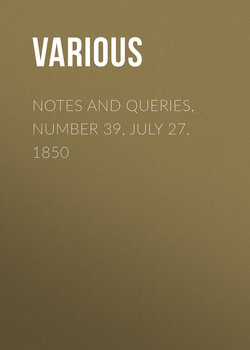Читать книгу Notes and Queries, Number 39, July 27, 1850 - Various - Страница 5
NOTES
Minor Notes
ОглавлениеPasquinade on Leo XII.—The Query put to a Pope (Vol. ii., p. 104.), which it is difficult to believe could be put orally, reminds me of Pope Leo XII., who was reported, whether truly or not, to have been the reverse of scrupulous in the earlier part of his life, but was remarkably strict after he became Pope, and was much disliked at Rome, perhaps because, by his maintenance of strict discipline, he abridged the amusements and questionable indulgences of the people. On account of his death, which took place just before the time of the carnival in 1829, the usual festivities were omitted, which gave occasion to the following pasquinade, which was much, though privately, circulated—
"Tre cose mat fecesti, O Padre santo:
Accettar il papato,
Viver tanto,
Morir di Carnivale
Per destar pianto."
J. Mn.
Shakspeare a Brass-rubber.—I am desirous to notice, if no commentator has forestalled me, that Shakspeare, among his many accomplishments, was sufficiently beyond his age to be a brass-rubber:
"What's on this tomb
I cannot read; the character I'll take with wax."
Timon of Athens, v. 4.
From the "soft impression," however, alluded to in the next scene, his "wax" appears rather to have been the forerunner of gutta percha than of heel-ball.
T.S. LAWRENCE.
California.—In the Voyage round the World, by Captain George Shelvocke, begun Feb. 1719, he says of California (Harris's Collection, vol. i. p. 233.):—
"The soil about Puerto, Seguro, and very likely in most of the valleys, is a rich black mould, which, as you turn it fresh up to the sun, appears as if intermingled with gold dust; some of which we endeavoured to purify and wash from the dirt; but though we were a little prejudiced against the thoughts that it could be possible that this metal should be so promiscuously and universally mingled with common earth, yet we endeavoured to cleanse and wash the earth from some of it; and the more we did the more it appeared like gold. In order to be further satisfied I brought away some of it, which we lost in our confusion in China."
How an accident prevented the discovery, more than a century back, of the golden harvest now gathering in California!
E.N.W.
Southwark.
Mayor of Misrule and Masters of the Pastimes.—the word Maior of Misrule appears in the Harl. MSS. 2129. as having been on glass in the year 1591, in Denbigh Church.
"5 Edw. VI., a gentleman (Geo. Ferrars), lawyer, poet, and historian, appointed by the Council, and being of better calling than commonly his predecessors, received his commission by the name of 'Master of the King's Pastimes.'"—Strutt's Sports and Pastimes, 340.
"1578. Edward Baygine, cursitor, clerk for writing and passing the Queen's leases, 'Comptroller of the Queen's pastimes and revels,' clerk comptroller of her tents and pavilions, commissioner of sewers, burgess in Parliament."—Gwillim, Heraldry, 1724 edit.
A.C.
Roland and Oliver.—Canciani says there is a figure in the church porch at Verona which, from being in the same place with Roland, and manifestly of the same age, he supposes may be Oliver, armed with a spiked ball fastened by a chain to a staff of about three feet in length. Who are Roland and Oliver? There is the following derivation of the saying "a Roland for your Oliver," without any reference or authority attached, in my note-book:—
"—Charlemagne, in his expedition against the Saracens, was accompanied by two 'steeds,' some writers say 'pages,' named Roland and Oliver, who were so excellent and so equally matched, that the equality became proverbial—'I'll give you a Roland for your Oliver' being, the same as the vulgar saying, 'I'll give you tit for tat,' i.e. 'I'll give you the same (whether in a good or bad sense) as you give me.'"
JARLTZBERG.
